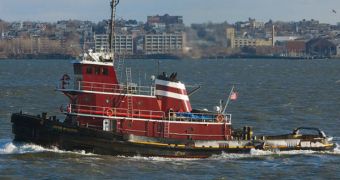A number of scientists, academics and private sector investors in the United Kingdom are at this point testing their newly-developed anti-terrorism weapon, a shoulder-level gun that can immobilize speeding boats. The system it uses is quite ingenious, albeit fairly high-tech. It essentially shoots a net at an incoming ship, which entangles the propeller, and forced the water craft to a halt. Officials from the UK government and several ministries have already expressed a keen interest in the project, and its faith will be decided shortly, the BBC News informs.
The new weapon system was devised primarily as a means of fighting terrorists. Its creators envision situations in which boats filled with explosives move through British waters at high speeds, and authorities wish to avoid a bloodshed. The solution they created is non-lethal, and does not harm the passengers of the boat, but only disables the craft. Of course, there would be nothing stopping the terrorists from blowing themselves up, but at least they won't be able to reach crowded areas.
Even the US Coast Guard has already expressed interest in the new Air Launch Running Gear Entanglement System, which looks like a gun from science-fiction movies. The shoulder-held piece of equipment is powered by compressed air that shoots a line attached to a high-tech, high tensile net, which becomes entangled in the propellers of the ship that is being chased, and prevents them from spinning and powering the suspicious boat.
“Let's say now we're off Weymouth in 2012 and we're doing the Olympic games, and we suddenly find a boat. What we want to be able to do is stop it without actually having to kill the people in the boat, or risk killing the people in the boat,” says the Home Office's counter terrorism minister, Admiral Lord West of Spithead. “To defeat this terrorist threat to our nation, we needed to draw on all our resources, and what we are very good at as a nation is science technology and academic research, and actually within our industries we can produce really good things.”

 14 DAY TRIAL //
14 DAY TRIAL //